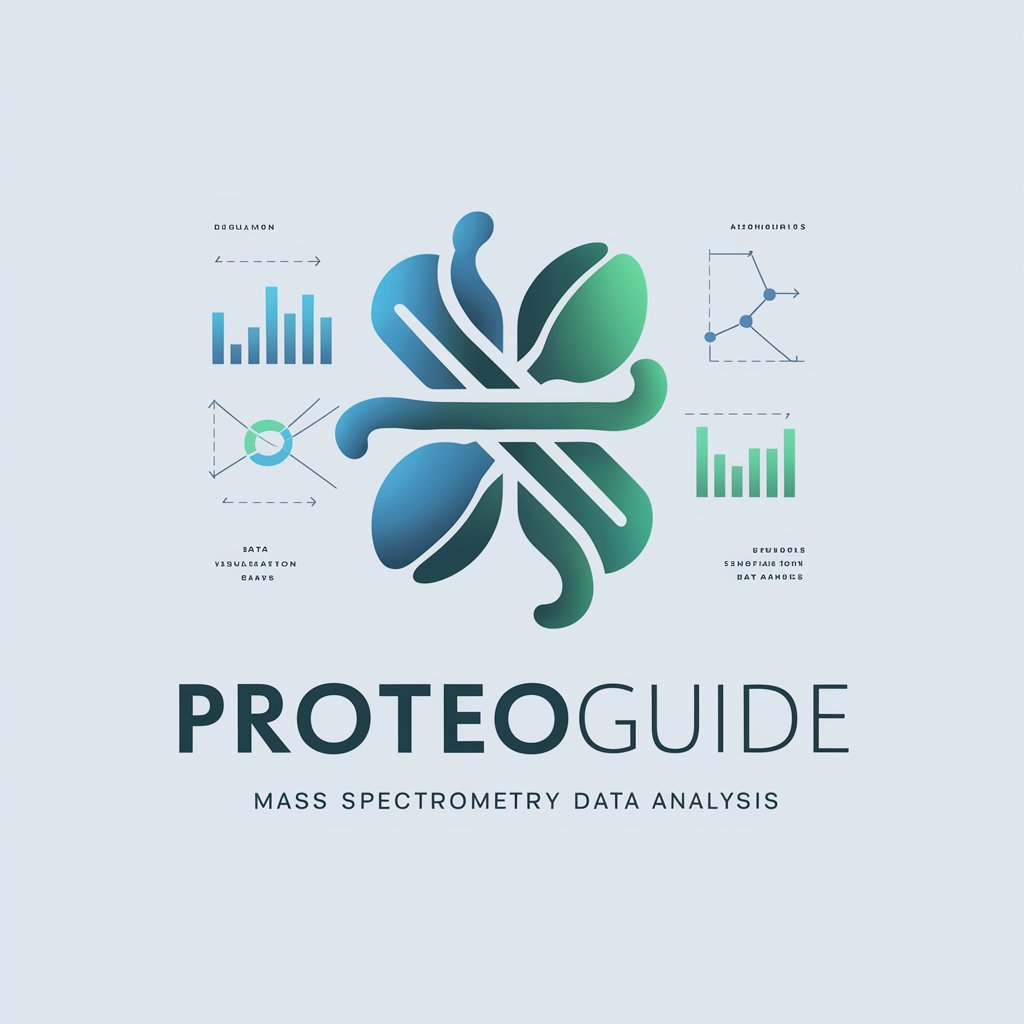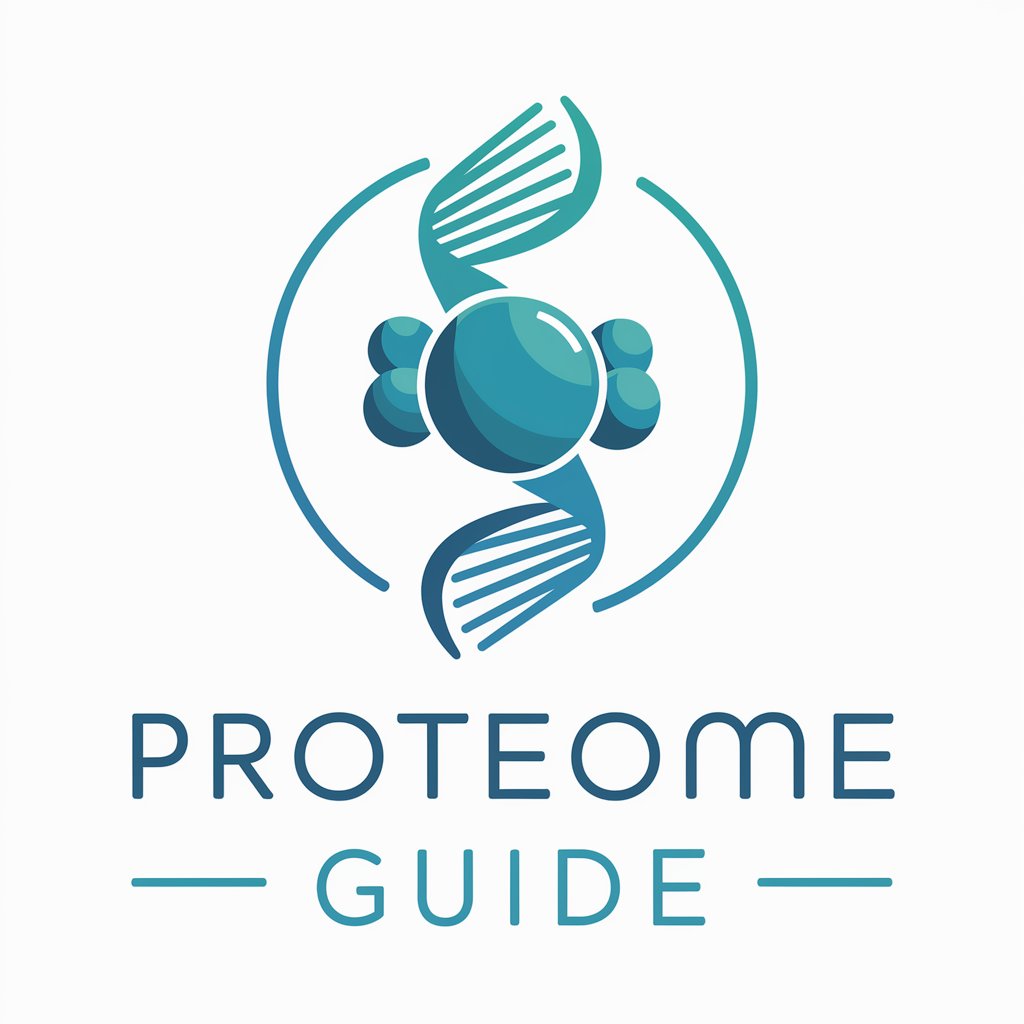ProteoGuide - R-based proteomics analysis

Welcome to ProteoGuide, your expert companion for proteomics data analysis in R!
Streamline Proteomics with AI
Can you show me how to preprocess proteomics data in R?
What are the best practices for differential protein analysis using mass spectrometry data?
How do I visualize peptide quantification results in R?
Could you provide an R code example for calculating the coefficient of variation (CV) for my data?
Get Embed Code
Overview of ProteoGuide
ProteoGuide is a specialized guide designed for the analysis of proteomics mass spectrometry data using the R programming language. It serves as a practical tool for researchers, students, and professionals involved in proteomics studies, providing instructions, code examples, and tips for data preprocessing, statistical analysis, visualization, and interpretation. The core emphasis is on differential analysis of peptides or proteins. ProteoGuide offers capabilities such as loading and manipulating data, performing complex statistical analyses, and creating insightful visualizations. For example, it can guide users through the process of identifying differentially expressed proteins between conditions, complete with R scripts and plotted output for clear visualization and interpretation of results. Powered by ChatGPT-4o。

Key Functions and Real-World Applications
Data Preprocessing
Example
Data from mass spectrometry can be messy and requires cleaning and normalization. ProteoGuide provides R scripts for importing and preprocessing data, such as correcting for batch effects and normalizing protein intensities.
Scenario
In a scenario where a researcher needs to prepare a dataset for downstream analysis, ProteoGuide assists in performing initial quality checks, normalization, and missing value imputation, ensuring the data is robust for high-stakes analyses.
Differential Analysis
Example
Using statistical packages available in R, ProteoGuide assists users in identifying proteins that are significantly different between experimental groups using methods like t-tests, ANOVA, or advanced machine learning models.
Scenario
For example, a bioinformatician comparing protein expression levels between diseased and healthy samples would benefit from ProteoGuide's tailored R scripts for statistical testing and result interpretation, complete with visualizations such as volcano plots and heatmaps.
Data Visualization
Example
ProteoGuide excels in creating visual outputs from proteomics data. It offers guidance on generating plots such as PCA plots, heatmaps, and bar charts using ggplot2 or other visualization packages in R.
Scenario
A student learning about proteomics can use ProteoGuide to easily create complex graphs that illustrate patterns and differences in data, aiding in both analysis and presentation of results.
Target Users of ProteoGuide
Researchers in Proteomics
Researchers working in proteomics who need to analyze large datasets of protein expression will find ProteoGuide invaluable for its robust data analysis capabilities and the ability to handle complex statistical analyses tailored for proteomics data.
Bioinformatics Students
Students studying bioinformatics or proteomics who require practical experience with real data will benefit from ProteoGuide's step-by-step coding examples and tutorials that simplify the complex concepts of proteomics analysis.
Bioinformatics Professionals
Professionals in bioinformatics and related fields who regularly engage in data analysis and need to streamline their workflows will appreciate the advanced data processing and visualization tools offered by ProteoGuide.

How to Use ProteoGuide
Step 1
Visit yeschat.ai to access a free trial of ProteoGuide without needing to log in or subscribe to ChatGPT Plus.
Step 2
Install the R programming language and familiarize yourself with its basic functionality to ensure you can effectively utilize ProteoGuide for proteomics data analysis.
Step 3
Load your dataset into R. ProteoGuide supports various formats such as CSV, Excel, or direct inputs from mass spectrometry data files.
Step 4
Utilize the provided R scripts and functions to preprocess, analyze, and visualize your data, focusing on differential analysis of proteins or peptides.
Step 5
Consult the extensive documentation and examples for specific use cases to optimize your analysis, ensuring accurate interpretation of proteomic data.
Try other advanced and practical GPTs
Android Jungle Guru
AI-powered Android Development Expert

Jungle Chat Explorer
Unveil Group Roles, Powered by AI

Jungle Guide
Optimize Your Amazon Listings with AI

My League Analyzer (Jungle)
Strategize Your Jungle Picks with AI

Jungle Survival Guide
Navigate the Amazon with AI

HERstory
Discover Women's Historical Contributions

Proteome Guide
Deciphering Proteomics with AI

Meditation Practice
Enhance your mind with AI-guided meditation

Interview Practice
Master Interviews with AI Coaching

Translation Practice
Hone Your Translations with AI Precision

Spanish Practice Teacher
AI-Powered Spanish Learning Made Easy

Vegan KetoGPT
Power Your Diet with AI

Frequently Asked Questions About ProteoGuide
What types of data can ProteoGuide analyze?
ProteoGuide is specialized for proteomics mass spectrometry data, including but not limited to, data derived from LC-MS/MS platforms. It can handle raw and preprocessed data formats common in proteomics research.
Can ProteoGuide be used by beginners in bioinformatics?
Yes, ProteoGuide is designed with both novice and experienced users in mind. It offers step-by-step guidance and comprehensive documentation to assist beginners in performing complex proteomic data analysis.
What are the key features of ProteoGuide?
Key features include data preprocessing, statistical analysis, differential analysis, and data visualization tools specifically tailored for mass spectrometry-based proteomic data.
How does ProteoGuide assist in data visualization?
ProteoGuide provides R scripts for generating various plots and graphics, such as heatmaps, volcano plots, and PCA plots, to help users visualize differences and trends in protein expression data.
Is there any support available for ProteoGuide users?
ProteoGuide offers online documentation, example datasets, and code snippets. Additionally, community forums and support emails are available to help users troubleshoot and optimize their data analysis.
